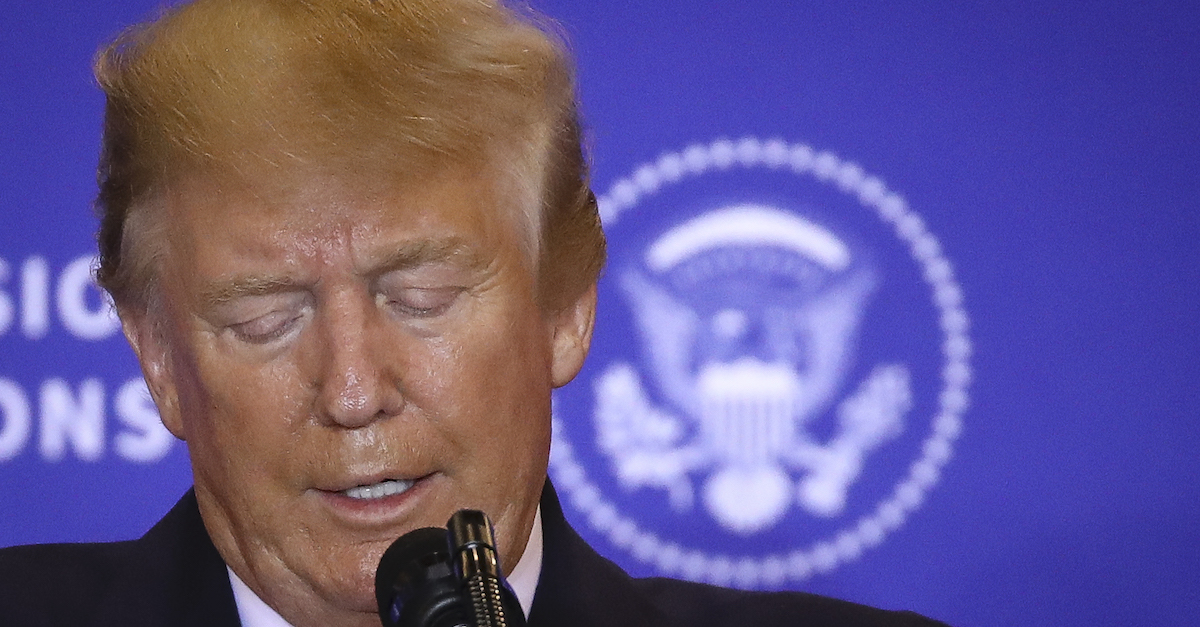
A second whistleblower threatens to further complicate the tenuous political fortunes of the increasingly embattled Trump administration. This time, concerns about the whistleblower are bipartisan.
According to the Washington Post, Senators Chuck Grassley (R-Iowa) and Ron Wyden (D-Ore.) dispatched their staff to meet with a concerned Internal Revenue Service (IRS) employee in early November. Those staff members are also reportedly planning follow-up interviews as part of a widening investigation into their claims.
As Law&Crime previously reported, the IRS whistleblower alleges that President Donald Trump–by way of a political appointee with the U.S. Department of the Treasury–attempted to interfere with the agency’s mandatory presidential audit system in order to somehow benefit Vice President Mike Pence or the president himself.
Those concerns were initially raised publicly in a largely-ignored court filing from August. That filing, largely a pro forma court submission related to an ongoing lawsuit to obtain Trump’s tax returns, included a letter from House Ways and Means Chairman Richard Neal (D-Mass.) addressed to Treasury Secretary Steve Mnuchin.
“On July 29, 2019, the Committee received an unsolicited communication from a Federal employee setting forth credible allegations of ‘evidence of possible misconduct’–specifically, potential ‘inappropriate efforts to influence’ the mandatory audit program,” Neal’s letter explains in extremely vague terms. “This is a grave charge that appreciably heightens the Committee’s concerns about the absence of appropriate safeguards as part of the mandatory audit program and whether statutory codification of such program or other remedial, legislative measures are warranted.”
That letter from Neal to Mnuchin continues:
The Committee has raised these concerns repeatedly, both in prior correspondence as well as at the June 10 briefing with staff from both Treasury and the IRS. Commissioner [Charles] Rettig, in his May 17, 2019 letter, responded that the “concern that IRS employees could be subject to undue influence when conducting mandatory audits of a President’s tax returns” is “unfounded.” The allegations received by the Committee cast doubt on this statement and underscore the pressing need for complete and meaningful oversight of the mandatory audit program.
The news sent shock waves through the political system.
Law&Crime then reached out to the Treasury Department Office of the Inspector General directly for confirmation of the whistleblower’s complaint and received an interesting response from the separate Treasury Inspector General for Tax Administration (TIGTA).
“Pursuant to Federal confidentiality laws, TIGTA cannot admit or deny its receipt of any complaint or any action it may be taking with respect to any complaint of administrative or criminal misconduct by IRS employees,” the agency told Law&Crime via email. “Upon receipt of all allegations of misconduct, TIGTA takes them seriously and takes any action it deems appropriate.”
A legal expert familiar with the federal government noted that this response was essentially a non-denial that likely meant an official whistleblower complaint was, in fact, somewhere in the system.
“Under the guise of ‘national security,’ or some ‘cognizable privacy interest’ federal agencies often deny requests for information under FOIA using what’s called a ‘Glomar’ response, which is named after a submarine, for some reason,” noted Civil Rights attorney with the Center for Constitutional Rights Angelo Guisado. “The provision allows federal agencies to ‘neither confirm nor deny’ the existence of records, which encapsulates perfectly the government’s commitment to operating with transparency, accountability, and fairness.”
The whistleblower, a career official with the IRS, met with the Washington Post and confirmed that an official complaint had been filed. The White House has dismissed the allegations and tried to cast the whistleblower as someone with a political axe to grind.
And two anonymous sources told the Post that more documents were recently filed by the whistleblower as well.
“In recent weeks, the whistleblower filed additional documentation related to the original complaint, which was given to congressional officials in July, the two people said,” the news outlet notes. “These people spoke on the condition of anonymity due to the sensitivity of the complaint, which pertains to a confidential IRS audit that cannot be disclosed under federal law.”
Monday’s revelations are likely to be seen as bolstering the whistleblower’s claims due to the investigations being conducted by two well-respected and powerful senators from both sides of the aisle.
“I am aware of public reports of a whistleblower complaint related to the mandatory audit program of the president and vice president,” Wyden said. “Because any discussion of this matter may implicate section 6103 privacy requirements or whistleblower protections, I cannot comment further on the matter.”
Wyden’s remarks implicated the federal statute which generally keeps all federal tax return information confidential.
[image via Drew Angerer/Getty Images]